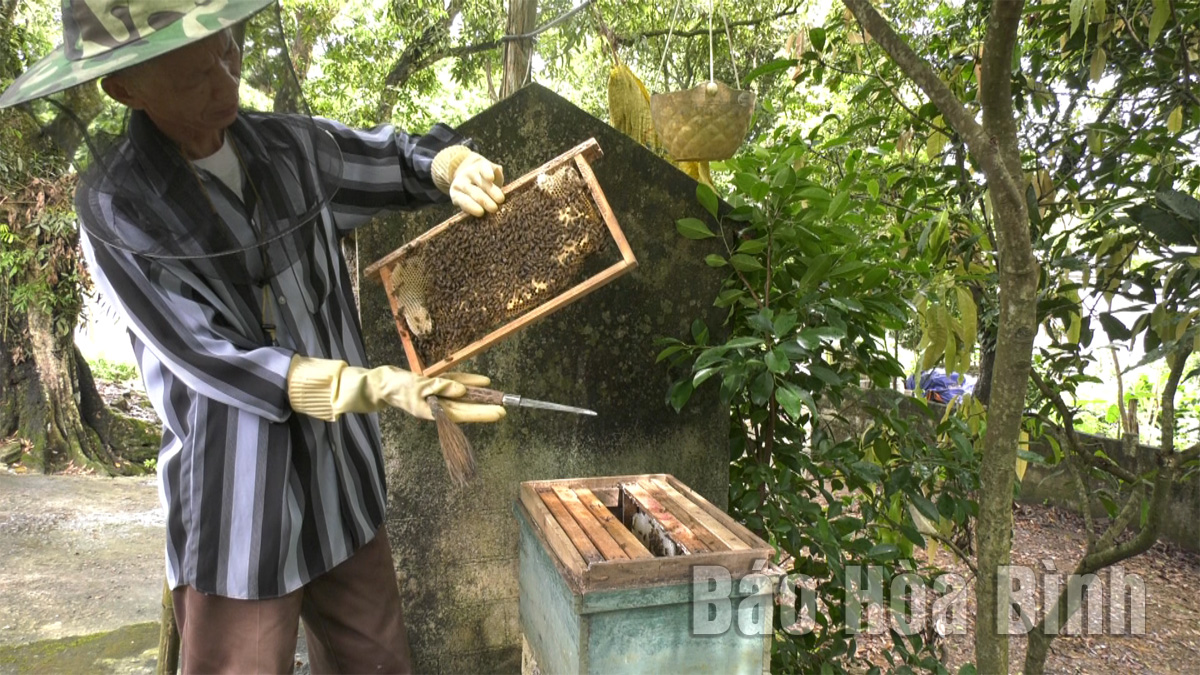
(HBO) - Yen Tan hamlet in Lac Luong commune (Yen Thuy district) is home to over 300 households, of which nearly 100 are raising honey bees. Taking advantage of hills, rich natural forests, and many kinds of flowers, especially wild flowers, farmers in Yen Tan village have for years developed beekeeping for honey.

Bui Van Bem's household, Yen Tan hamlet, Lac Luong
commune (Yen Thuy) maintains beekeeping, earning an average income of 80
million VND per year.
In 2012, thanks to a poverty reduction project, beekeepers
in Yen Tan had chances to participate in science and technology training
courses. In 2014, Yen Tan beekeeping cooperative was set up.
Quach Tat Vo, Director of the Yen Tan Beekeeping
Cooperative, said that at first, the cooperative had 300 bee colonies. In order
to improve output and product quality, the cooperative has continuously
bettered techniques and invested in machinery. To date, the cooperative has 26
members and over 800 bee colonies. Cooperative members earn an average profit
of 60-80 million VND (2,550-3,403 USD) per year. Compared with other economic
models in the locality, beekeeping is easy to do and less risky, and brings
higher economic efficiency. The cooperative's honey products have their quality
and food hygiene and safety ensured, thus creating a prestigious, quality and
reliable brand favoured by customers. In the coming time, the cooperative will
continue to effectively develop the model of beekeeping for honey, with focus
on affirming the quality and building the Yen Tan honey brand in the market.
Vo said that Yen Tan honey has gained a firm foothold in the
market. In 2021, it was recognised as a 3-star OCOP product at the provincial
level. The efficiency of beekeeping has contributed to reducing the poverty
rate of the hamlet. The average income per capita in 2022 reached over 39
million VND, and the poverty rate decreased to 12.78%. Currently, the
cooperative not only keeps bees for honey but also pays attention to expanding
production scale, modernising equipment, and promoting Yen Tan honey brand.
Beekeeping has brought changes to local people. With the
direction of developing honey beekeeping into a commodity, Yen Tan beekeeping
cooperative has been building a brand, contributing to improving livelihoods
and generating income for local households./.
According to data from the Hoa Binh Provincial Party Committee, the industrial production index for the first six months of 2025 is estimated to have increased by 20% compared to the same period last year. This marks the highest year-on-year growth rate for this period since 2020.
In the first six months of 2025, Hoa Binh province’s export turnover was estimated at 1.145 billion USD, marking an 18.11% increase compared to the same period in 2024. Import turnover was estimated at $ 804 million, a 17.15% increase, which helped the province maintain a positive trade balance.
The lives of the ethnic minority farmers in Tan Lac district have gradually improved thanks to the new directions in agricultural production. This is a testament to the collective strength fostered through the professional associations and groups implemented by various levels of the district’s Farmers’ Union.
With the motto the "product quality comes first,” after nearly one year of establishment and operation, Muong village’s Clean Food Agricultural and Commercial Cooperative, located in Cau Hamlet, Hung Son Commune (Kim Boi district), has launched reputable, high-quality agricultural products to the market that are well-received by consumers. The products such as Muong village’s pork sausage, salt-cured chicken, and salt-cured pork hocks have gradually carved out a place in the market and they are on the path to obtaining the OCOP certification.
In the past, the phrase "bumper harvest, rock-bottom prices" was a familiar refrain for Vietnamese farmers engaged in fragmented, small-scale agriculture. But today, a new spirit is emerging across rural areas of Hoa Binh province - one of collaboration, organisation, and collective economic models that provide a stable foundation for production.
Maintaining growing area codes and packing facility codes in accordance with regulations is a mandatory requirement for agricultural products to be eligible for export. Recently, the Department of Agriculture and Environment of Hoa Binh province has intensified technical supervision of designated farming areas and packing facilities to safeguard the "green passport" that enables its products to access international markets.



